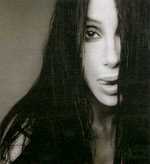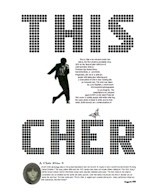 Thinking about Angelica Huston's new memoir (because one of my friends asked for it for Christimas) and ruminating on her comments about writing it, I'm reminded again of the kind of book Cher might write. Cher could easily put out two books, too, by the way
Thinking about Angelica Huston's new memoir (because one of my friends asked for it for Christimas) and ruminating on her comments about writing it, I'm reminded again of the kind of book Cher might write. Cher could easily put out two books, too, by the way
Last week, in a book called The Mindful Writer I found this quote:
“Let’s say you’re writing about your childhood…as you write, there are multiple variations of you [writing]. There is the wounded nine-year-old you, still (because childhood can be so searingly painful) aching after all of these years. There is the angry teenage you, still needing somehow to rebel, to lash out. There is the twenty-something you who finally recognized how much pain and anger there was in your childhood and what seemed normal to the youngster was neither normal nor healthy. And perhaps there is the forty-three or sixty-three-year-old you, sitting at the desk, trying to explain and explore the memories that somehow never go away. Whose perspective are you going to bring to the [story]? That is not a simple question—there is no right or wrong answer…There is no reason to tackle a subject, even your own life story, if you are not seeking understanding, looking to learn something, asking questions to which you do not know the answer.” That is what will make the work interesting to the reader, and that is what will make the process worthwhile for you.”
One of the recent issues of "Poets & Writers" magazine also broached the topic in an article by William Giraldi:
“…there’s never been a consummately honest memoir, that all memoirs are fictionalized to one degree or another. The memory’s intrinsic fallibility makes an accurate book unattainable from the word go.”
Happily, complete honesty is not the point of it. If the impossibility of complete honesty ever stopped us, no one would ever tell a story to anybody–ever. Language is fallible but do you stop speaking? No, you acknowledge the imperfection as part of the life of the art.


Leave a Reply